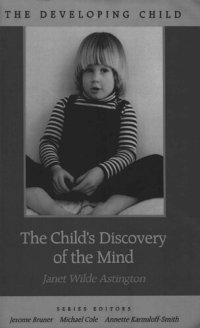
Ebook: The Child's Discovery of the Mind
Author: Janet Wilde Astington
- Genre: Psychology
- Tags: philosophy of mind in children cognition in children theory of mind Jean Piaget cognitive development schooling autism epistemology folk psychology
- Year: 1993
- Publisher: Harvard University Press
- Language: English
- pdf
Three-year old Emily greets her grandfather at the front door: u201cWeu2019re having a surprise party for your birthday! And itu2019s a secret!u201d We may smile at incidents like these, but they illustrate the beginning of an important transition in childrenu2019s livesu2014their development of a u201ctheory of mind.u201d Emily certainly has some sense of her grandfatheru2019s feelings, but she clearly doesnu2019t understand much about what he knows, and surprisesu2014like secrets, tricks, and ties all depend on understanding and manipulating what others think and know.
Jean Piaget investigated childrenu2019s discovery of the mind in the 1920s and concluded that they had little understanding before the age of six. But over the last twenty years, researchers have begun to challenge his methods and revise his conclusions. In The Childu2019s Discovery of the Mind, Janet Astington surveys this lively area of research in developmental psychology. Sometime between the ages of two and five, children begin to have insights into their own mental life and those of others. They begin to understand mental representationu2014that there is a difference between thoughts in the mind and things in the world, between thinking about eating a cookie and eating a cookie. This breakthrough reflects their emerging capacity to infer other peopleu2019s thoughts, wants, feelings, and perceptions from words and actions. They come to understand why people act the way they do and can predict how they will act in the future, so that by the age of five, they are knowing participants in social interaction. Astington highlights how crucial childrenu2019s discovery of the mind is in their social and intellectual development by including a chapter on autistic children, who fail to make this breakthrough.
u201cMindu201d is a cultural construct that children discover as they acquire the language and social practices of their culture, enabling them to make sense of the world. Astington provides a valuable overview of current research and of the consequences of this discovery for intellectual and social development.
Jean Piaget investigated childrenu2019s discovery of the mind in the 1920s and concluded that they had little understanding before the age of six. But over the last twenty years, researchers have begun to challenge his methods and revise his conclusions. In The Childu2019s Discovery of the Mind, Janet Astington surveys this lively area of research in developmental psychology. Sometime between the ages of two and five, children begin to have insights into their own mental life and those of others. They begin to understand mental representationu2014that there is a difference between thoughts in the mind and things in the world, between thinking about eating a cookie and eating a cookie. This breakthrough reflects their emerging capacity to infer other peopleu2019s thoughts, wants, feelings, and perceptions from words and actions. They come to understand why people act the way they do and can predict how they will act in the future, so that by the age of five, they are knowing participants in social interaction. Astington highlights how crucial childrenu2019s discovery of the mind is in their social and intellectual development by including a chapter on autistic children, who fail to make this breakthrough.
u201cMindu201d is a cultural construct that children discover as they acquire the language and social practices of their culture, enabling them to make sense of the world. Astington provides a valuable overview of current research and of the consequences of this discovery for intellectual and social development.
Download the book The Child's Discovery of the Mind for free or read online
Continue reading on any device:

Last viewed books
Related books
{related-news}
Comments (0)